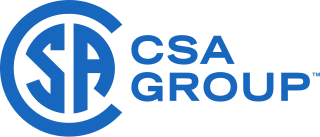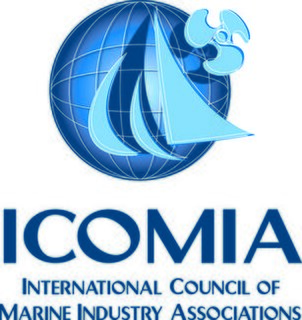Related Research Articles

UL Solutions is a global safety certification company headquartered in Northbrook, Illinois. It maintains offices in 46 countries. Established in 1894 as the Underwriters' Electrical Bureau, it was known throughout the 20th century as Underwriters Laboratories and participated in the safety analysis of many of that century's new technologies. As of 2022, the company has rebranded as UL Solutions.

The Royal Yachting Association (RYA) is a United Kingdom national governing body for sailing, dinghy sailing, yacht and motor cruising, sail racing, RIBs and sportsboats, windsurfing and personal watercraft and a leading representative for inland waterways cruising.

The CSA Group is a standards organization which develops standards in 57 areas. CSA publishes standards in print and electronic form, and provides training and advisory services. CSA is composed of representatives from industry, government, and consumer groups.

Markel Corporation is a holding company for insurance, reinsurance, and investment operations around the world. Headquartered in Richmond, Virginia and founded in 1930, Markel reports its ongoing underwriting operations in three segments, and products originate from three insurance divisions and one reinsurance division. Through Markel Ventures, they allocate capital to invest in opportunities outside of insurance.
A Marine Surveyor is a person who conducts inspections, surveys or examinations of marine vessels to assess, monitor and report on their condition and the products on them, as well as inspects damage caused to both vessels and cargo. Marine surveyors also inspect equipment intended for new or existing vessels to ensure compliance with various standards or specifications. Marine surveys typically include the structure, machinery and equipment and general condition of a vessel and/or cargo. It also includes judging materials on board and their condition. Because certifications and subsequently payments are processed only after the surveyor has expressed his or her satisfaction, a marine surveyor holds a prestigious position and is held with much regard in the shipbuilding industry. Marine Surveyors are highly qualified and technically sound and are usually selected after thorough evaluation procedures as vessels ranging from small ferries to enormous crude oil carriers and cruise liners are approved to sail into the high seas based purely on their judgment, competence and integrity.
A ship classification society or ship classification organisation is a non-governmental organization that establishes and maintains technical standards for the construction and operation of ships and offshore structures. Classification societies certify that the construction of a vessel comply with relevant standards and carry out regular surveys in service to ensure continuing compliance with the standards. Currently, more than 50 organizations describe their activities as including marine classification, twelve of which are members of the International Association of Classification Societies.
Intrinsic safety (IS) is a protection technique for safe operation of electrical equipment in hazardous areas by limiting the energy, electrical and thermal, available for ignition. In signal and control circuits that can operate with low currents and voltages, the intrinsic safety approach simplifies circuits and reduces installation cost over other protection methods. Areas with dangerous concentrations of flammable gases or dust are found in applications such as petrochemical refineries and mines. As a discipline, it is an application of inherent safety in instrumentation. High-power circuits such as electric motors or lighting cannot use intrinsic safety methods for protection.
Listing and approval use and compliance is the practice of installing and operating safety-related products and materials in accordance with to minimum performance conformance testing requirements. The conformance could be for a certification listing or for an approval that has been issued by an organization that is accredited both for testing and product certification. Such organizations include Underwriters Laboratories, FM Global, or the Deutsches Institut für Bautechnik (DIBt).
Nippon Kaiji Kyokai is a ship classification society. It is also known by the brand name “ClassNK” or often in the industry as just “NK”. ClassNK is a non-profitable non-governmental organization dedicated to ensure the safety of life and property at sea, and the prevention of pollution of the marine environment.

The Electrical Safety Foundation International (ESFI), formerly the National Electrical Safety Foundation, is a 501(c)(3) non-profit organization based in Rosslyn, Virginia, US dedicated exclusively to promoting electrical safety at home, school, and in the workplace. Founded in 1994 as a cooperative effort by the National Electrical Manufacturers Association (NEMA), Underwriters Laboratories (UL), and the US Consumer Product Safety Commission (CPSC), ESFI is funded by charitable contributions from, distributors, Nationally Recognized Testing Laboratories, retailers, insurers, utilities, safety organizations, and trade and labor associations. The mission of the Electrical Safety Foundation International (ESFI) is to reduce electrically related injuries, deaths and fires; saving lives and property through public education and outreach.
The National Association of Marine Surveyors Inc. (NAMS) is a Houston, TX based not-for-profit educational association that aims to advance the marine surveying profession by certifying anyone with 5 years surveying experience and by providing them opportunities to enhance knowledge through ongoing professional education. They act as a standard-bearing organization in that their members are required to pass an open book exam on surveying fundamentals.
The Fire Equipment Manufacturers' Association (FEMA) is a trade body for fire protection providers, based in Cleveland, Ohio.
Nationally Recognized Testing Laboratory is the term used by the United States Occupational Safety and Health Administration to identify third-party organizations that have the necessary qualifications to perform safety testing and certification of products covered within OSHA and each organization's scopes. The testing and certification are conducted in accordance with U.S. consensus-based product safety test standards developed or issued by U.S. standards organizations

The Bureau of Indian Standards (BIS) is the National Standards Body of India under Department of Consumer affairs, Ministry of Consumer Affairs, Food & Public Distribution, Government of India. It is established by the Bureau of Indian Standards Act, 2016 which came into effect on 12 October 2017. The Minister in charge of the Ministry or Department having administrative control of the BIS is the ex-officio President of the BIS. BIS has 500 plus scientific officers working as Certification Officers, Member secretaries of technical committees and lab OIC's.
Huckins Yacht Corporation is one of the oldest boat builders in the United States. The company is located on the Ortega River in Jacksonville, Florida, and is run by its third-generation owners, Cindy and Buddy Purcell. Huckins manufactures custom yachts ranging from 40 to 90 feet that combine classic design and traditional workmanship with modern technology and amenities. It has built a total of 457 yachts during its 80 years of operation, crafting vessels one at a time.
The autonomous non-profit organisation Soyuzexpertisa CCI RF (SOEX) is the largest accredited certification body in the Russian Federation, a subsidiary of the Chamber of Commerce and Industry of the Russian Federation. An expert holding, SOEX is involved in laboratory quality and safety control of goods, expertise and audit, certification, and evaluation, provides support in increasing the effectiveness of purchase actions, carries out forensic and construction surveys, performs production quality-control inspections, and tests transportation and storage of electro-technical and power-generation equipment, materials, and nuclear fuel for Russian and foreign companies, as well as rendering services around inspection control of cargo, damage evaluation, and surveyors’ maintenance Main peers in Russia and abroad: SGS, Bureau Veritas S. A., Saуbolt, SGS, Alex Steuard, Russurvey, IMCS, CRS, Inspectorat, Rostest, Transconsulting, Eximtest, Rospromtest

The International Council of Marine Industry Associations is a non-profit international trade association that brings together national recreational marine industry associations and represents them at an international level. ICOMIA has currently 35 full members representing virtually all countries with an active recreational marine industry in Europe, North America, Asia and Australia.
Vessel safety surveys are inspections of the structure and equipment of a vessel to assess the condition of the surveyed items and check that they comply with legal or classification society requirements for insurance and registration. They may occur at any time when there is reason to suspect that the condition has changed significantly since the previous survey, and the first survey is generally during construction or before first registration. The criteria for acceptance are defined by the licensing or registration authority for a variety of equipment vital to the safe operation of the vessel, such as safety equipment, lifting equipment, hull structure, static stability, ground tackle, propulsion machinery, auxiliary machinery, etc. The SOLAS Convention, specifies safety equipment for commercial vessels operating internationally.

Submarine signals had a specific, even proprietary, meaning in the early 20th century. It applied to a navigation aid system developed, patented and produced by the Submarine Signal Company of Boston. The company produced submarine acoustic signals, first bells and receivers then transducers, as aids to navigation. The signals were fixed, associated with lights and other fixed aids, or installed aboard ships enabling warning of fixed hazards or signaling between ships. ATLAS-Werke, at the time Norddeutsche Maschinenund Armaturenfabrik, of Germany also manufactured the equipment under license largely for the European market.